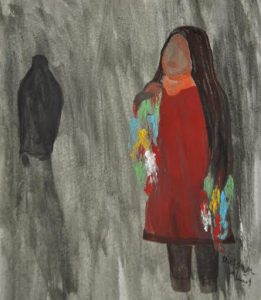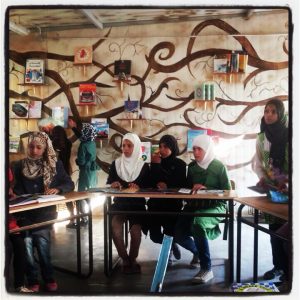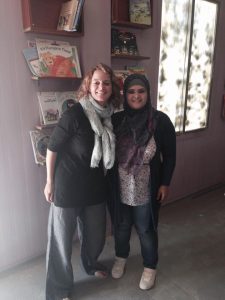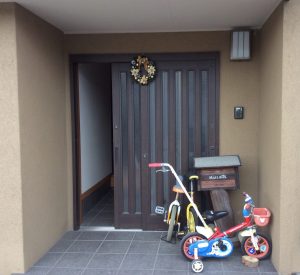
by World Moms Blog | Apr 1, 2015 | Feminism, Girls, Gratefulness, Guest Post, Human Rights, Husband, Priorities, School, Social Equality, Uncategorized, Women's Rights, Working Mother
 Kids complain about going to school today? Have them read this guest post, which comes to us from Ibtisam in Oman. You can find more of her wonderful perspective on her blog: ibtisammusings.com.
Kids complain about going to school today? Have them read this guest post, which comes to us from Ibtisam in Oman. You can find more of her wonderful perspective on her blog: ibtisammusings.com.
Sometime in the late 1960s, there was a six-year-old girl whose father did not believe education was of any benefit to her. However, because her eldest brother took a stand that education was her right, she went to school and was quite intelligent in her studies. She did not make it to high school, but those first few years meant the world to her.
Fast-forward to 1998. There was 18 year-old girl who just graduated from high school with grades that enabled her to receive a government scholarship to further her studies. She had a dream of studying somewhere abroad. Her father supported her endlessly without having a second thought about it.
Two women, my mother and me, received a life-changing education made possible by the men in our family. In our part of the world, and specially for some women, it was like asking for the moon. The sad thing is, that is still the case for many other women.
In 2010, my husband registered me for a Master’s degree course in business administration. I had two children at that time who were 2 and 4 years old. I had a house to take care of, but he believed I could do it, and I did do it with his full and endless support. He ’empowered’ me to do the course before himself, although it is what he wanted to do for many years.
I worked for ten years at a hospital, then I quit to start my own business. I still can remember one woman I know crying as she wanted so badly to start her business and follow her dream, but her husband gave her a hard time and made it impossible for her.
Initially, the thought of quitting my job scared me to death. Then, the moment that moral support from my husband was there, everything seemed easy. This year, my sister-in-law had an opportunity to work abroad. She found the courage to go for it when her husband, my brother, told her not to worry and that he would support her decision, no matter what it was.
Maybe many will think, ‘how does a man’s decision affect a woman’s choices?’ Well, in my society it does. You can find few girls who managed to follow their dreams despite the resistance they faced. However, this can be so tough and risky in a collectivist society where family ties are sacred.
Maybe we are living the good time for women empowerment in my country and many other countries around us. I hear and read the word ‘woman empowerment’ everywhere in our media. There are conferences, workshops, lectures etc. on this specific issue. This is the reason why I decided to write this. I have this deep feeling of gratitude towards the men in my life, and for men like them who recognize the rights of women. Without their support, love and encouragement, ‘woman empowerment conferences’ would be a story with a sad ending for us.
picture credit: the author
World Moms Blog is an award winning website which writes from over 30 countries on the topics of motherhood, culture, human rights and social good. Over 70 international contributors share their stories from around the globe, bonded by the common thread of motherhood and wanting a better world for their children.
World Moms Blog was listed by Forbes Woman as one of the "Best 100 Websites for Women 2012 & 2013" and also called a "must read" by the NY Times Motherlode in 2013. Our Senior Editor in India, Purnima Ramakrishnan, was awarded the BlogHer International Activist Award in 2013.
More Posts

by Shaula Bellour (Indonesia) | Mar 12, 2015 | 2015, Awareness, Being Thankful, Exercise, Expat Life, Family, Health, Hobby, Identity, Indonesia, Inspirational, Life, Life Balance, Life Lesson, Living Abroad, Maternal Health, Me-Time, Motherhood, New Year's Resolutions, Parenting, Responsibility, Running, School, Shaula Bellour, Womanhood, World Motherhood
 Last Sunday I ran my first 5K race. I still can’t believe that I actually did it – and in the tropical heat, no less. Although I have vaguely considered it a worthy goal, running an actual race wasn’t on my radar even two months ago.
Last Sunday I ran my first 5K race. I still can’t believe that I actually did it – and in the tropical heat, no less. Although I have vaguely considered it a worthy goal, running an actual race wasn’t on my radar even two months ago.
It turns out that 2015 is the year of living dangerously…out of my comfort zone.
My kids often talk about being “risk-takers”. It is one of the ten traits included in the school Learner Profile and students are encouraged to be inquirers, knowledgeable, thinkers, communicators, principled, open-minded, caring, risk-takers, balanced, and reflective. While these traits are all deemed equally important, being a risk-taker is a concept that seems to be especially resonant outside of school too: “I am a risk-taker: I am willing to make mistakes. I am confident and have the courage to try new things.”
For my generally confident (and fruit-averse) daughter, this might mean: “Look Mommy, I’m a risk-taker, I’m eating a mango!” My son takes a more reflective approach – acknowledging when he feels nervous about doing something and emboldening himself with his risk-taker status to eventually take the plunge. Though risk-taking will probably have a different connotation when they are older, I embrace what it means for them now – trying new things and not being afraid to make mistakes.
It’s an important lesson for grown ups, too.
In January, after three years of living in Jakarta, I was starting to feel like my daily life was becoming somewhat routine. Gym, work, grocery store, repeat. To change things up, I found myself saying YES to things that I might not usually consider.
When a friend asked if I wanted to join their early morning running group, I said YES. I knew that the group would likely be too advanced for me but figured that I wouldn’t know if I didn’t try. “What’s the worst that could happen?” I asked myself. I would walk, that’s it. I did walk some at first, but I set my own goals and improved each week. Now we’re training for a 10K.
When another friend asked if I would like to be part of their dance group for an upcoming fashion show event, I said yes to that too. Other friends and even my husband were surprised. Performing a dance routine in front of a huge crowd is WAY beyond my comfort zone, but again I thought: “Why not?” In this case I try not to think about the worst that could happen (falling off the stage comes to mind) but I’m proud of myself for doing it and am actually looking forward to the big night.
I’ve continued with the YES theme in other areas of my life and have already seen positive changes: improved health, new friendships, new possibilities. I’ve realized that pushing my boundaries in this way is also about adjusting my own perceptions of myself. “Oh, but I’m not a runner,” I would repeatedly explain, trying to somehow qualify my actions.
Well now I am a runner. And a dancer. Among many other things.
Life begins at the end of your comfort zone.
Our kids may not recognize some of the bigger risk-taking decisions we’ve made (like moving our lives halfway around the world), but it’s often the smaller actions that resonate the most.
It feels good for them to see that I can be a risk-taker too – I can be afraid sometimes and I can also be brave, just like they are.
When I walked in the door after the race, finisher’s medal around my neck, both kids jumped up from the couch with wide eyes. “Mommy!” my daughter exclaimed, “I didn’t know you would win the race!”
Not exactly…but YES! In my own way, I did.
What risks are you putting out there for yourself this year? How are you embracing these challenges?
This is an original post for World Moms Blog by our mom of twins in Jakarta, Indonesia, Shaula Bellour.
The image used in this post is attributed to the author.
Shaula Bellour grew up in Redmond, Washington. She now lives in Jakarta, Indonesia with her British husband and 9-year old boy/girl twins. She has degrees in International Relations and Gender and Development and works as a consultant for the UN and non-governmental organizations.
Shaula has lived and worked in the US, France, England, Kenya, Eritrea, Kosovo, Lebanon and Timor-Leste. She began writing for World Moms Network in 2010. She plans to eventually find her way back to the Pacific Northwest one day, but until then she’s enjoying living in the big wide world with her family.
More Posts

by Salma (Canada) | Feb 20, 2015 | 2015, Babies, Canada, Child Care, Communication, Discipline, Home, Homeschooling, Homeschooling, Kids, Life Lesson, Motherhood, Parenting, Preschool, Salma, School, Working Mother, World Motherhood, Younger Children

I recently left my job in a poverty law office to start a daycare and pre-school. Before opening my home, I researched every aspect of the business; at least I thought I did. Since I’d been homeschooling since forever, I thought that my new venture would be an extension of what I had been doing. What you can’t find written in pages of wisdom is how to get through the day with young children – that is something you have to experience on your own. (more…)

An Imperfect Stepford Wife is what Salma describes herself as because she simply cannot get it right. She loves decorating, travelling, parenting,learning, writing, reading and cooking, She also delights in all things mischievous, simply because it drives her hubby crazy.
Salma has 2 daughters and a baby boy. The death of her first son in 2009 was very difficult, however, after the birth of her Rainbow baby in 2010 (one day after her birthday) she has made a commitment to laugh more and channel the innocence of youth through her children. She has blogged about her loss, her pregnancy with Rainbow, and Islamic life.
After relocating to Alberta with her husband in 2011 she has found new challenges and rewards- like buying their first house, and finding a rewarding career.
Her roots are tied to Jamaica, while her hubby is from Yemen. Their routes, however, have led them to Egypt and Canada, which is most interesting because their lives are filled with cultural and language barriers. Even though she earned a degree in Criminology, Salma's true passion is Social Work. She truly appreciates the beauty of the human race. She writes critical essays on topics such as feminism and the law, cultural relativity and the role of women in Islam and "the veil".
Salma works full-time, however, she believes that unless the imagination of a child is nourished, it will go to waste. She follows the philosophy of un-schooling and always finds time to teach and explore with her children. From this stance, she pushes her children to be passionate about every aspect of life, and to strive to be life-long learners and teachers. You can read about her at Chasing Rainbow.
More Posts - Website

by Jacqueline Jenkins (Jordan) | Feb 4, 2015 | Caring, Education, Gender, Helping, Human Rights, Humanity, Jordan, Multicultural, Refugees, refugees, Relocating, School, Social Good, Uncategorized, United Nations, World Motherhood
GRIT.

The girl children in the library reading the books which Jackie Jenkins bought.
We talk about it a lot as educators and parents. A few weeks ago I saw what it really means: to dig deep and push on with a smile on your face and a belief in a better tomorrow, even when faced with war on your doorstep and trauma in your past.
I had been waiting to go to the Zataari refugee camp with Rob (my husband and Representative for UNICEF Jordan) since we arrived in Jordan. The day finally arrived.
We viewed the water sanitation facilities and delivery trucks, which was fascinating. As an educator, however, I was most excited to see some of the schools. I was in my element the minute we walked through the gates. While Rob went to check on the status of classroom desks, play space construction, and water in the latrines, I wanted to see some kids.
I met two incredible principals of the girls’ section of school (girls attend school in the morning, boys in the afternoon). They told me that the Ministry of Education has done an excellent job at getting them all the teaching materials they need and that the school was in good condition. But class sizes are a problem. . . and so we began to walk. . . .
Grade 2 has more than 100 students in a classroom. Girls sit three to a bench, with the overflow sitting on the floor. When I walked in, they burst into a song, which I am sure I was meant to stand and smile at. But I can’t help myself around small people, so I just started dancing all over the place, up the aisles and in the front. The girls laughed and laughed. Kids are the same everywhere! But these children deserve a whole lot more after what they have been through.

World Mom, Jackie Jenkins, with Iman Alkhaldi, the Librarian.
Luckily, there are people in their lives like Iman, whom I also met that day. She single-handedly built a library in one of the containers that serve as school rooms. She painted it, collected wood to build shelves, and is now looking for books. She spoke good enough English for me to understand her dreams and passion, and for me to tell her, “It is women like you who will change the world. You already are.” She cried, and I cried, and I also promised I would fill that room with books written in Arabic and English.
So I left with a new mission. If Iman can build a library oasis, if the dedicated teachers can manage to educate 100 students in a classroom without a complaint after walking out of their country affected by war, I could certainly help fill that library.
Within hours of being home, we set up a crowdrise page for donations. I sent out emails to international schools globally telling them the story of Iman and the children I had met. My 14 year old daughter talked it up on her social media networks, and I went to bed that night feeling a fire in my belly that I had not felt since my arrival. A deep passion to make a small difference in an immediate way. It seems the story resonated with many. In just 48 hours, I had reached my target goal, and was able to purchase more than 500 English and Arabic books, which were delivered to the library within the week.
Grit plus humanity–the connection and compassion with those around us–can accomplish astounding results. Yet again, I am filled with a sense of hope for the future of a region plagued by conflict and stress.
How do you help our children grow up with grit and the perseverance to face the challenges inevitable in their future? What is one concrete thing you might be able to do in your home or life that is a change for good?

We are a few months into our new 'home of our heart' location in Amman, Jordan. Originally from Canada, I have been moving around the globe for more than twenty years as my husband works for UNICEF. While we were a carefree couple in Uganda, Lesotho and Bangladesh, Meghan joined our family in 2000, while we were living in Myanmar. She was joined in 2005, while we were posted in India by Charlie, her energetic younger brother! Since then we have lived in Mozambique and New York. I am an educator and have been incredibly fortunate to have found rewarding jobs in international schools wherever we have been posted. Most recently I was the Elementary School Principal at the United Nations International School in Manhattan. Since arriving in Jordan, I have been a stay at home Mum, exploring, photographing and learning about the incredible history of the region and the issues facing not only the Jordan population but the incredible number of Syrian refugees currently residing in the country. While I speak English and French, I have not yet started to learn Arabic; a big goal for our time here.
I write to record and process this incredible journey we are on as a family. Time passes so incredibly quickly and without a recording of events, it's hard to remember the small moments and wonderings from each posting. Being a mother in this transient lifestyle means being the key cheerleader for our family, it means setting up and taking down a house with six weeks notice, it means creating close friendships and then saying goodbye. All this, while telling yourself that the opportunities your children have make the goodbyes and new hellos worthwhile. Raising a child in this lifestyle has incredible challenges and rewards. The challenges include culture shock every single time, even when you feel the move will be an easy one. It means coaching yourself, in your dark moments to be present and supportive to your children, who have not chosen to move but are trusting you to show them the world and the meaningfulness of the lifestyle we have committed to as a UNICEF family. The upsides to this lifestyle are incredible; the ability to have our children interact and learn about cultures, languages, food, and religions firsthand, the development of tolerance and empathy through relationships with many types of different people and the travel, they have been to more places before the age of ten than some people do in a lifetime! My commitment to raising children who believe in peace and feel responsible for making a difference in creating a better world is at the core of everything I do.
More Posts
Follow Me:


by Melanie Oda (Japan) | Jan 8, 2015 | 2014, Awareness, Child Care, Childhood, Culture, Domesticity, Education, Expat Life, Eye on Culture, Family, Feminism, Grandparent, Home, Husband, International, Japan, Life, Life Lesson, Living Abroad, Marriage, Me-Time, Motherhood, Multicultural, Parent Care, Parenting, Priorities, Relationships, Responsibility, School, Social Equality, Womanhood, Women's Rights, World Motherhood, Younger Children
 Gender equality has been in the news quite a bit in Japan recently, sort of, and some things have happened closer to home that have me thinking.
Gender equality has been in the news quite a bit in Japan recently, sort of, and some things have happened closer to home that have me thinking.
It started when a (female) Tokyo assembly member was heckled in a sexist way. Then Prime Minister Abe introduced some new policies to let women “shine.” (He needs to get them doing something for the economy.) He even appointed several women to cabinet posts, for about five minutes, until they were slapped back down into their places over minor scandals.
In Japan, people are talking more about issues women face but no one seems to be doing much about them.
(Lest I forget: strangely enough, the declining birth rate is treated as a “women’s issue.” I seem to remember my husband being involved, too.)
I never considered myself a feminist growing up. Some members of the evangelical, conservative community I grew up in doubtless felt “feminist” was a new version of the “F-word.”
OK, so I went to a high school with more sports options for boys than girls. And yes, girls were encouraged to take chorus and home economics instead of woodworking or mechanics. So maybe I heard men from my community refer to grown women as “broads” or “gals.” There also were some restrictions at church regarding women’s and men’s roles. But I never felt that possessing certain types of baby-making parts limited my potential.
Then I moved to Japan, where gender roles are more firmly entrenched and my way of thinking slowly changed.
As I get older, and because I am a mother, I find that I am limited in ways that I couldn’t have foreseen as a young girl.
Some people may find life here in Japan freeing. If you aspire to be a homemaker a la Martha Stewart, then your life’s work would be very much respected and appreciated here. My husband wouldn’t bat an eyelid if he came home to a messy house because I’d spent the day at a preschool mothers’ lunch. He knows that is part of the job (on the other hand, it would never occur to him to pick up the mess himself.)
If, as a woman, you have other aspirations, Japanese culture seems designed to work against you. The glass ceiling is very much in tact. On the news here you do hear issues like lack of childcare and “maternity harassment” being addressed. But what gets talked about less often is that to many women, including myself, it feels as if there’s a glass door as well.
It’s my front door.
Before a woman can even think about what is facing her out in the world, she needs to address the forces that are keeping her at home. Some of these are practical, some are logistical, some are cultural and perhaps peculiar to Japan and it’s work culture.
For me, it starts with my husband: He leaves home at 7am every morning, but I have no idea what time he will be back. Sometimes it’s 7pm. Sometimes it’s midnight. He may be in the office that day, or he may suddenly be sent to another prefecture. He’s made international trips on 12 hours notice. I cannot depend on him being home at a designated time, by no fault of his own. The idea of him taking time off with a sick child is preposterous in the extreme.
I have been lucky enough to have two job offers recently, both of which would be more or less during school hours, but neither is nearby. If a child were to get sick and need picking up, or if god-forbid there was a natural disaster (which is always in the back of your mind if you are a mother in Japan,) then my husband would be closer. I mentioned that, and he completely shot me down. Not just the idea of him picking up the kids in case of an emergency, but the idea of a job anywhere outside of cycling distance from the school.
We live in a residential neighborhood. I patch together some part-time work here and there, but it’s not like there are loads of professional opportunities in a two kilometer radius.
I suddenly felt very limited, penned in, in a way I haven’t felt before. The glass door was slamming in my face.
I don’t think I’m alone in this conundrum. Go to almost any supermarket in a residential area during the day, and you will see women in their prime working years manning the register. Many of these women have university degrees. Many have licenses and qualifications to be doing other kinds of work, but they want to stay close to home. They also need salaries to stay under $10,000 year or face a peculiar Japanese tax code and insurance system that penalizes families where both partners have incomes over that amount.
Then there are my kids: Like 2/3 of Japanese women with children under 6, I stayed home when they were small. They now completely depend on me for everything. It seems to have never entered their minds that someone else could give them a bath or help them find their missing socks, mostly because no one else has ever done anything for them. Especially when they are sick, they want only me. It was very hard when my daughter was in the hospital, both children wanting to be with me and emphatic that no one else would do.
But now my youngest is in elementary school, and I would like to just be doing more of something….else, but for me to plunge into the workforce would be a huge adjustment for my children. Is it worth the stress? Can we survive what is sure to be a painful adjustment period?
Maybe if I had more family support, it would feel less impossible but as it is, it seems like everyone is against me.
Which brings me to the final characters in this comedy, my in-laws: They say they’ll watch the kids, then they change their minds. Or something better comes up. From their point of view, this house and these people are completely my responsibility. Anything they do is extra credit.
To be honest, we’re getting to the point where my in-laws need my help more than I need theirs.
They aren’t shy about letting me know my place.
One day not too long ago, my son was playing at the park with his friends. It was getting close to homework time, so I called him and told him to come home. He said he was playing with Jiji (which is an endearing term for grandfather used in our region of Japan,) and could he play for a bit longer? Since he was out with an adult, I said okay.
The next day, I got a verbal whipping from my father-in-law over the phone, accusing me of being irresponsible, a bad mother. It took me a few minutes to understand why he was saying this, but when I got to the bottom of it, I realized my son had lied to me. He was playing with his friends when Jiji walked by and told him to go home. My son told him I wasn’t at home and said he couldn’t come back until I did. (I must have called right at this point.) “How dare you not be home in the afternoon?” said Jiji.
Putting aside that none of this nonsense was true, so what if I wasn’t home in the afternoon? Of course I wouldn’t have left the kids to wander the neighborhood like stray dogs, but why was my not physically being inside my house such an issue to him? His assumption that it was my duty to be always available to everyone took me by surprise.
I could almost hear the glass door slamming again.
There are also other barriers for women in Japan—an over active PTA for one, and a myriad of community responsibilities attended to exclusively by women for another. I imagine most women in the world encounter both the “glass door” and the “glass ceiling” in some form or another, but in Japan only one of these factors is seems to be getting much attention. Building new daycare facilities isn’t enough; the government stating goals to increase women’s participation in the workforce isn’t enough. Until we do something about that glass door, nothing will change for one of the best educated, least utilized group of women in the world.
Do you feel you are fulfilling your potential, both at work and at home? What’s the situation like in your country?
This is an original post for World Moms Blog from our writer and mother of two in Japan, Melanie Oda.
If you ask Melanie Oda where she is from, she will answer "Georgia." (Unless you ask her in Japanese. Then she will say "America.") It sounds nice, and it's a one-word answer, which is what most people expect. The truth is more complex. She moved around several small towns in the south growing up. Such is life when your father is a Southern Baptist preacher of the hellfire and brimstone variety.
She came to Japan in 2000 as an assistant language teacher, and has never managed to leave. She currently resides in Yokohama, on the outskirts of Tokyo (but please don't tell anyone she described it that way! Citizens of Yokohama have a lot of pride). No one is more surprised to find her here, married to a Japanese man and with two bilingual children (aged four and seven), than herself. And possibly her mother.
You can read more about her misadventures in Asia on her blog, HamakkoMommy.
More Posts
by Mama B (Saudi Arabia) | Nov 26, 2014 | Adolescence, Awareness, Boys, Brothers, Culture, Education, Eye on Culture, Family, Gender, Girls, Husband, International, Life Lesson, Motherhood, Older Children, Parenting, Puberty, Relationships, Saudi Arabia, School, Teenagers, Womanhood, World Motherhood
I grew up in a house full of girls with one baby brother, who was so much younger than me that our friends and social lives didn’t overlap.
Now that I am the mother of three boys and one girl, I am learning many things I never knew about boys: they are more straightforward, easier to read, and, honestly, easier to persuade than girls. Boys wrestle–a lot. Even when they haven’t got the hang of walking yet, they wrestle. (I still don’t know why.) Boys are more emotional than I expected, and more sensitive.
I know there’s a lot more to learn about raising boys, and I’m excited to do it–especially because I can call in their father whenever something freaks me out.
Despite my growing expertise in raising boys, something recently caught me off guard. Something obvious in our society, but not so prevalent in my ‘tribe’ (which is what I call my close family–mother, father, aunts, uncles, cousins, etc.).
My eldest turned 11 this year, and is in the phase between boy and teenager. And I find myself surprised to discover that our society’s segregation of men and women is changing my relationship with my own son.
I was totally unprepared for the separation that occurred when he moved from the little school to the big school. I went from being able to walk into his class, to speak to his teacher, and to meet his friends and their moms, to having to drop him off and pick him up outside the school gate (but not right in front of it, where the other boys could see us).
No more going into the school, unless I make an appointment with the headmaster and go to his office to speak with the teachers. (And even that is not permissible in most boys’ schools, the majority of which would not even allow a woman on the premises. The same is true for girls’ schools, which don’t permit men on the premises.)
My son can no longer go into the all-women area of the malls. In a few years, he won’t be allowed in any area of the mall without a ‘family’ for fear he will terrorize the girls. (Ironically, some young teenagers wait outside the malls and approach older women, or women with children, and ask them to pretend they are one family to gain entrance into the mall.)
Soon, my son won’t invite his friends over when his sister is home, although he could still invite cousins and close family friends.
There are so many unwritten rules concerning the separation of girls and boys, and a million variations. For some families, it’s pretty black and white: unless he is your brother or father, or unless she is your sister or mother, you don’t spend time with them. It also depends upon the region. In the eastern or western provinces, strict segregation is not as prevalent as it is here in the central region. In seacoast areas, people have the benefit of interacting with many cultures, and are therefore more forgiving.
I am baffled by how our society has become so segregated. Throughout the early history of Islam, segregation wasn’t practiced. Modesty and chastity, yes. Total segregation, no. I do not even think it was part of our culture as Saudis. At least, not to the extent it is today.
Until recently, Bedouin women were expected to welcome travelers into their tents, and to make them coffee, and even dinner, regardless of whether her husband was there. Yes, most would have had their faces covered (again, a cultural custom, not religious one), but they interacted with men all the time. It’s only in recent years that things have changed. Some put it down to the influences that came into Saudi when it was united. Others say it is a reaction to how fast we were exposed to the outside world, and how quickly we went from tribal life to modern-day life.
Theories aside, I’m facing the reality of being shut out of a part of my son’s life and of him being shut out of mine.
When I explained my concern to one of his teachers (over the phone) he said, “You can’t follow him around all of his life!” As if I were a stalker! Am I being a stalker? Hmmm, I wonder how involved I would be in his day-to-day school life if I were?
My biggest fear is that if he gets caught up in the wrong crowd, segregation makes it easier in certain houses with absent fathers to make mistakes and do stupid stuff. I thank God his father keeps an eye on him, and that he still fills me in about his day and talks to me when he is upset. If we can continue to talk, I think I may be okay.
Perhaps I just don’t like not being in control of the situation, or perhaps it’s that I don’t have the choice.
Would you naturally step back from your son’s day-to-day life when he turns 11 or 12? Would you withdraw from knowing his friends and supervising his outings?
It’s all foreign territory for me now, and I am learning to deal with it as best I can.
This is an original post to World Moms Blog from our contributor in the Kingdom of Saudi Arabia and mother of four, Mama B.
Photo credit: Dr. Coop under Flickr Creative Commons License

Mama B’s a young mother of four beautiful children who leave her speechless in both, good ways and bad. She has been married for 9 years and has lived in London twice in her life. The first time was before marriage (for 4 years) and then again after marriage and kid number 2 (for almost 2 years). She is settled now in Riyadh, Saudi Arabia (or as settled as one can be while renovating a house).
Mama B loves writing and has been doing it since she could pick up a crayon. Then, for reasons beyond her comprehension, she did not study to become a writer, but instead took graphic design courses. Mama B writes about the challenges of raising children in this world, as it is, who are happy, confident, self reliant and productive without driving them (or herself) insane in the process.
Mama B also sheds some light on the life of Saudi, Muslim children but does not claim to be the voice of all mothers or children in Saudi. Just her little "tribe." She has a huge, beautiful, loving family of brothers and sisters that make her feel like she wants to give her kids a huge, loving family of brothers and sisters, but then is snapped out of it by one of her three monkeys screaming “Ya Maamaa” (Ya being the arabic word for ‘hey’). You can find Mama B writing at her blog, Ya Maamaa . She's also on Twitter @YaMaamaa.
More Posts

 Kids complain about going to school today? Have them read this guest post, which comes to us from Ibtisam in Oman. You can find more of her wonderful perspective on her blog: ibtisammusings.com.
Kids complain about going to school today? Have them read this guest post, which comes to us from Ibtisam in Oman. You can find more of her wonderful perspective on her blog: ibtisammusings.com.













